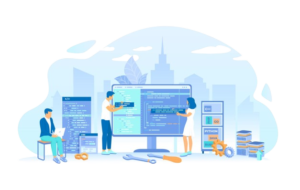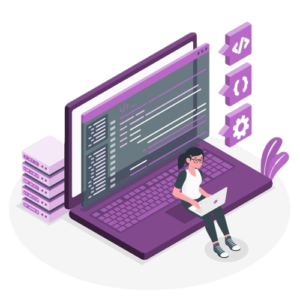What Is Full Stack Development? | A Complete Guide
Introduction to Full Stack Development
What Is Full Stack Development? | A Complete Guide In the realm of software development, Full Stack Development has emerged as a comprehensive approach to building web applications. It encompasses both frontend and backend development, along with knowledge of databases and deployment environments. Full Stack Developers possess a broad skill set, making them versatile assets in the tech industry.

What is Full Stack Development?
It involves working with various technologies and frameworks to create fully functional and interactive web applications.
Importance of Full Stack Development
This versatility is invaluable in agile development environments where teams require individuals capable of handling multiple tasks efficiently.

Skills Required for Full Stack Development
Becoming a proficient Full Stack Developer entails mastering a range of skills across different domains of web development.
Frontend Development
Frontend Development involves creating the user interface and user experience of a web application. Proficiency in HTML, CSS, and JavaScript is essential for building responsive and visually appealing interfaces.
Backend Development
Backend Development focuses on the server-side logic and database interactions of a web application. Knowledge of programming languages like Python, JavaScript (Node.js), or Ruby, along with frameworks like Django, Express, or Ruby on Rails, is necessary for building robust backend systems.
Database Management
Full Stack Developers should be familiar with relational databases like MySQL, PostgreSQL, or NoSQL databases like MongoDB.
DevOps
DevOps skills involve deployment, automation, and infrastructure management. Full Stack Developers should be capable of deploying applications on various platforms and configuring servers to ensure optimal performance and scalability.
Backend Technologies
Node.js, Django, Flask, and Spring Boot are among the popular backend technologies chosen by Full Stack Developers for building scalable server-side applications.

Database Management Systems
MySQL, PostgreSQL, MongoDB, and Firebase are commonly used database management systems for storing and managing application data.
Benefits of Full Stack Development
Versatility
Full Stack Developers can work on both frontend and backend components of a project, allowing them to contribute across the entire development lifecycle.
Cost-Effectiveness
Hiring Full Stack Developers eliminates the need for separate frontend and backend developers, resulting in cost savings for businesses.
Rapid Development
Full Stack Developers can independently develop and deploy features, leading to faster iteration cycles and quicker time-to-market for products.
Challenges and Pitfalls
Complexity
Managing both frontend and backend components of a web application can be complex and challenging, requiring a deep understanding of multiple technologies.

Continuous Learning
The tech landscape is constantly evolving, requiring Full Stack Developers to stay updated with the latest tools and technologies.
Security Concerns
Securing web applications against potential vulnerabilities and cyber threats is a significant challenge for Full Stack Developers.
Career Opportunities in Full Stack Development
Job Roles
Full Stack Developers can pursue various roles such as Web Developer, Software Engineer, Technical Lead, or Solutions Architect.
Salary Insights
According to industry reports, Full Stack Developers command competitive salaries due to their versatile skill set and high demand in the job market.
Growth Prospects
The demand for Full Stack Developers is expected to grow steadily, offering ample opportunities for career advancement and professional growth.
Steps to Become a Full Stack Developer
Learning Path
Aspiring Full Stack Developers can start by learning the fundamentals of web development, followed by mastering frontend and backend technologies.
Building Projects
Building projects and contributing to open-source initiatives can help developers hone their skills.
Networking and Skill Enhancement
Networking with industry professionals and participating in developer communities can provide valuable insights and opportunities for skill enhancement.

